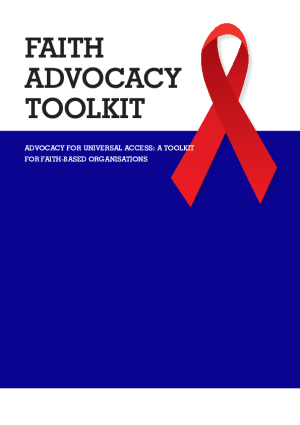HIV and AIDS Faith Advocacy Toolkit
Drawing upon a wide literature on HIV, religion, and advocacy, this toolkit aims to equip and inspire people to use the strength of their faith communities to advocate for the achievement of universal access to HIV prevention, treatment, care, and support. It contains a background on faith-based advocacy and HIV, a guide to planning advocacy campaigns, an overview of universal access, and additional advocacy resources. The toolkit was prepared as part of the Ecumenical Advocacy Alliance’s HIV and AIDS campaign “Live the Promise,” based on the knowledge that churches are living with and affected by HIV and AIDS. The campaign aims to hold individuals, governments, religious leaders, and faith organizations accountable for the commitments they have made and be advocates for further efforts and resources to respond to HIV and AIDS.
